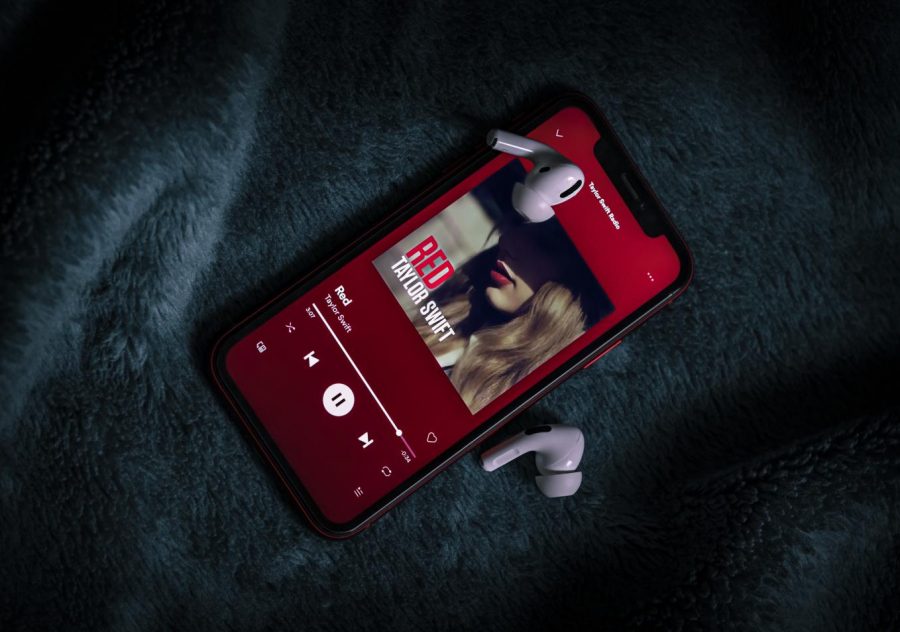“All Too Well”: A Lyrical and Symbolic Masterpiece
This new version of one of Taylor Swift’s greatest songs makes a classic even better.
November 19, 2021
After years of anticipation, Taylor released the re-recording of her 2012 album, Red, complete with additional tracks that have never been heard before. Most prominent, Taylor Swift released a 10-minute version of the fan-favorite song “All Too Well”. Along with the extended and revised version of these songs, she’s also created a cinematic universe surrounding them.
After the release of her album, Swift premiered a short film self-written and self-directed titled All Too Well: The Short Film, starring Dylan O’Brien, Sadie Sink, and Taylor Swift. With Swift’s reputation of writing songs about past relationships, many fans speculate that the age difference between Sink and O’Brien is similar to that of Taylor Swift and actor Jake Gyllenhaal, who the song is rumored to be about. For reference, Sink is 19 and O’Brien is 30, while Swift and Gyllenhaal were 19 and 30, respectively, when they started dating. The song lyrically brought to light the age difference between the song’s couple, with lyrics like “I’ll get older but your lovers stay my age” and “You said if we had been closer in age maybe it would have been fine”. Throughout the 15 minutes short film, Swift continued to allude to her relationship with Gyllenhaal from meaningful mementos to painful reenactments.
The first symbol Swift introduced in the film was a red scarf. According to the song, Swift left the scarf at her ex-boyfriend’s sister’s house, which many people assume to mean Gyllenhaal’s real-life sister. In the fictional world of the film, the red scarf travels from memory to memory and eventually makes an appearance at the very end when the ex-boyfriend makes an appearance in the scarf at a book reading that now-author Taylor Swift is giving 13 years later.
Another symbol Swift slips into the short film is O’Brien’s Gyllenhaal-inspired wardrobe. From the moment we are introduced to O’Brien’s nameless character, he bears a canny resemblance to Gyllenhaal. Swift’s very particular choice in O’Brien’s wardrobe consists of primarily sporting plaid shirts and beanies, staples of Gyllenhaal’s real-life wardrobe. Similarly, Sink channels a popular Swift look: a black turtleneck and red lipstick to replicate what she would have been wearing during the time of their relationship.
During the non-musical portion of the short film, a hugely symbolic moment is while Sink washes the dishes after a dinner party. O’Brien and Sink’s characters end up having a fight over the fact that he let go of her hand at the dinner table. Swift also makes note of a dropped hand on her track “Champagne Problems” from her 2020 release Evermore, singing, ”Because I dropped your hand while dancing. Left you out there standing. Crestfallen on the landing. Champagne problems”.
The film features a symbolic scene of Sink sitting down in front of a birthday cake, surrounded by friends, thinking back to her lover who did not attend her 21st birthday. In this recreation of Swift’s infamous birthday celebration, the song “The Moment I Knew” echoed in the background. “Standing there in my party dress … With no one to impress/And they’re all laughing as I’m looking around the room/But there was one thing missing/And that was the moment I knew”. This clearly played a role in the breakup and Swift’s heartbreak.
After the breakup in the short film, Sink is seen crying on the bed while ignoring a call and presses the top of the iPhone, a small detail that lines up with where iPhone lock buttons were located on the phone in 2010 which is when Swift and Gyllenhaal dated.
Regardless of whether the scarf or the gestures toward Gyllenhaal are purely lyrical inventions, what matters most about this song is how much it resonates with listeners, no matter their own stories. What makes “All Too Well” a fan favorite and modern classic is much simpler than Easter eggs and breadcrumb trails. Its greatest gift, and Swift’s lyrical genius, is managing to strike that hard-to-nail balance between uniquely personal and universally relatable writing.


